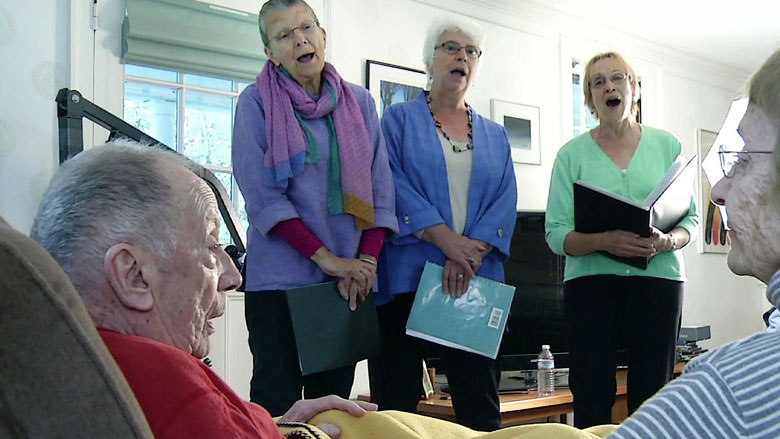Hospice choirs comfort the dying with song
By Associated Press | May 24, 2016, 12:49 EDT
 In this May 2, 2016 still image from video, members of JourneySongs choir sing for Norman Doelling, left, and his wife Jean at their home in Newton, Mass. One of a growing number of hospice choirs across the country, the all-volunteer group sings, by invitation only, at the bedsides of the elderly and terminally ill in hospitals, nursing homes and private residences. (AP Photo/Rodrique Ngowi)
In this May 2, 2016 still image from video, members of JourneySongs choir sing for Norman Doelling, left, and his wife Jean at their home in Newton, Mass. One of a growing number of hospice choirs across the country, the all-volunteer group sings, by invitation only, at the bedsides of the elderly and terminally ill in hospitals, nursing homes and private residences. (AP Photo/Rodrique Ngowi) NEWTON, Mass. (AP) – The singers enter single file, taking slow, deliberate steps as they intone a soft melody.
Norman Doelling, an 85-year-old who recently suffered a stroke, is there waiting, an audience of one, eased into a recliner in the home where he’s lived for decades in the Boston suburbs.
“I guess I lived too long,” he jokes in a halting voice after the group finishes serenading him. “It was very charming. I have a great deal of appreciation. It was very nice of them to come and sing to an old man.”
The eight mostly older women are members of JourneySongs, one of hundreds of hospice choirs across the country and world.
The all-volunteer a cappella groups sing, when invited, at the bedsides of the elderly and terminally ill in hospitals, nursing homes and private residences. They offer calming melodies meant to bring comfort to relatives, caregivers and their loved ones.
“We’re all about doing peaceful, quiet and uplifting songs,” says Kate Mason, the coordinator for JourneySongs. “It’s almost as good as a touch. We touch people with love through our music.”
Jean Doelling says she invited the choir as a way to brighten the day for her mostly bedridden husband, who had worked for decades at the Massachusetts Institute of Technology.
“It just described what we’re experiencing,” says the 83-year-old Doelling after the group quietly files out of the house. “Norman is a very happy, content person. We’re experiencing the autumn of our life, and we’re doing it together.”
Singing to the dying has been done for centuries worldwide, mostly in the privacy of people’s homes, says Kate Munger, founder of Threshold Choir, a Santa Rosa, California, group that’s credited with helping launch the modern hospice choir movement.
But as end-of-life care moved to hospitals and nursing facilities, those traditions eroded, she says. Hospice choirs are, in some ways, trying to fill that void.
“It’s difficult and challenging work, but it’s also deeply satisfying,” Munger says. “People don’t sign up for this unless they’re sure this is something they’re called to do.”
Munger formed her group in 2000 after singing to a dying friend with AIDS. The nonprofit organization now has more than 100 chapters across the U.S., Canada, the United Kingdom and Australia.
On a recent weekday night, dozens of volunteers gathered at a music school in Littleton, about 40 miles northwest of Boston, for the twice-monthly rehearsal of the Threshold Singers at Indian Hill Music, a group affiliated with Munger’s organization.
Seated in a circle, the members took turns lying in a reclining chair in the center as small groups of singers performed at their side, much as they would to a patient.
“It’s the least ego of any singing that I’ve done,” says Charlotte Russell, the group’s music director and a voice instructor. “It’s not about standing out as a soloist. It’s about comforting the person who is dying and also giving their family a little respite. It sort of takes that weight off them because you’re sharing that vigil with them.”
Singing experience generally isn’t a requirement, and volunteers aren’t trained as hospice care workers.
Choirs affiliated with the Threshold Choir sing spare melodies that are often just a simple phrase – “You are not alone. I am here beside you” is a commonly used one – repeated in different vocal styles by small groups of two to four singers.
JourneySongs, the group that visits Norman Doelling, takes a slightly different approach.
The members perform a wide range of songs from different faith and world traditions, as well as some popular music. They also opt for larger groups of singers.
But most choirs, regardless of their approach, will ask a few questions in advance to get a sense of the person’s personality and what songs might be appropriate.
On this particular day, the JourneySongs singers know that Norman was a competitive sailor and that the couple sailed frequently from New England’s waters to the Bahamas.
They do a rendition of “Crossing the Bar,” a sea-themed Alfred Lord Tennyson poem often interpreted as a metaphor for a person’s final journey in life.
Jean Doelling’s face lights up.
“That was always a favorite of Norman’s,” she says. “There’s a version of it in our kitchen, hanging on the wall. Isn’t that right, Norman?”
Her husband nods. “That was very nice.”
Written by Philip Marcelo











